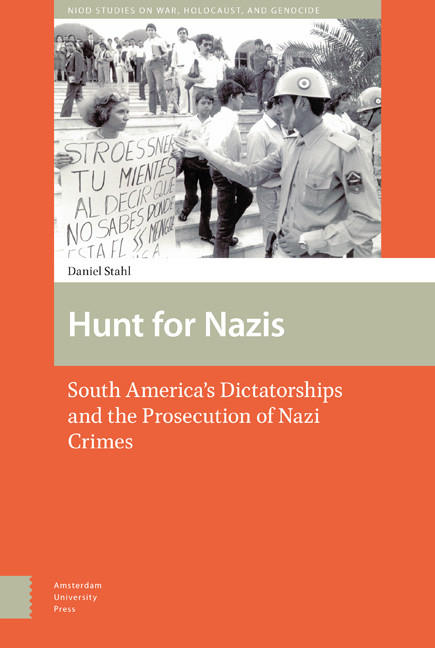Book contents
- Frontmatter
- Contents
- Preface to the English translation
- Introduction
- I The ‘Fourth Reich’
- II Reluctant Manhunt
- III Nazi Hunting as Political Opposition
- IV Two Ways of Dealing with State Atrocities
- Conclusion
- Acknowledgements
- The Most Important Manhunts and Extradition Proceedings
- Abbreviations
- Sources and Literature
- Index
- NIOD Studies on War, Holocaust, and Genocide
- Frontmatter
- Contents
- Preface to the English translation
- Introduction
- I The ‘Fourth Reich’
- II Reluctant Manhunt
- III Nazi Hunting as Political Opposition
- IV Two Ways of Dealing with State Atrocities
- Conclusion
- Acknowledgements
- The Most Important Manhunts and Extradition Proceedings
- Abbreviations
- Sources and Literature
- Index
- NIOD Studies on War, Holocaust, and Genocide
Summary
Adolf Eichmann, Franz Stangl, Klaus Barbie, Josef Schwammberger, Erich Priebke, and Dinko Šakić. Ultimately only six fugitives in South America were ever brought to justice, most of them decades after the end of the Second World War. That makes it apparent how much resistance there was in both Europe and South America to their prosecution. Nonetheless, the fact that after years in exile the fugitives increasingly felt less safe than before indicates a fundamental transformation. On both sides of the Atlantic, more and more people demanded that state-sanctioned crimes be subject to punishment. Conversely, arguments that perpetrators were only following orders and thus couldn't be held culpable lost their social, political, and legal acceptance.
The development by no means proceeded in a straight line, nor did it happen independently on the two continents. On the contrary, there was a great amount of mutual transcontinental influence in how to deal with state-sanctioned violent crimes. The hunt for Nazis is a perfect illustration of such connections, one that wouldn't have come to light in a single-nation examination. The ways in which European and South American governments and authorities treated Nazi fugitives since the 1940s is not just a part of the history of the legal prosecution of Nazi crimes. The South American reactions to requests for legal assistance also reveal the extent to which individual authorities thought it legitimate for the state to oppress people in their countries. Rightly, activists back then drew parallels between the use – and later investigation – of state oppression by South American governments and the way they dealt with Nazi fugitives. The Nazi hunt became a part of confronting post-war authoritarian regimes, and there were instances in which efforts to bring Nazi criminals to justice also provided impulses for prosecuting state-sanctioned violence in South America. And conversely the position taken by South Americans toward state oppression had consequences for how Nazi crimes were dealt with in Europe.
The American efforts to use the Mexico City Agreement to keep war criminals from fleeing to South America weren't only aimed at hindering an evasion of post-war justice. They were also about preventing the European fascist elite from infiltrating Latin American countries and turning South America into a cradle of new aggression.
- Type
- Chapter
- Information
- Hunt for NazisSouth America's Dictatorships and the Prosecution of Nazi Crimes, pp. 315 - 326Publisher: Amsterdam University PressPrint publication year: 2018



